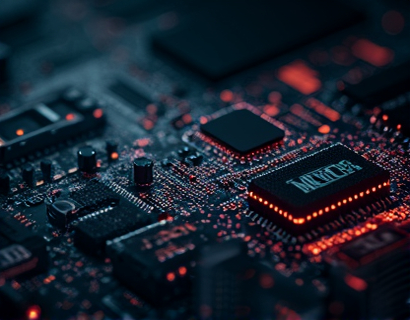Next-Gen Smart Contract AMMs: Unlocking Optimal DeFi Trading and Liquidity Management
In the rapidly evolving world of decentralized finance, or DeFi, the integration of advanced smart contract-based Automated Market Makers (AMMs) is transforming the landscape of trading and liquidity management. These innovative tools are designed to provide crypto traders and DeFi enthusiasts with more efficient, transparent, and secure trading experiences. This article delves into the intricacies of next-generation smart contract AMMs, exploring how they optimize DeFi trading and liquidity management, and the benefits they bring to the crypto ecosystem.
Understanding Smart Contract AMMs
Traditional AMMs rely on algorithms to determine asset prices and manage liquidity pools, eliminating the need for order books and market makers. Smart contract AMMs take this concept a step further by leveraging the power of blockchain technology to create decentralized, trustless environments for trading. These AMMs are built on top of blockchain networks, ensuring transparency, immutability, and accessibility to a global audience.
The core mechanism of a smart contract AMM involves liquidity pools, which are collections of tokens locked in a smart contract. Users can deposit tokens into these pools, earning liquidity provider (LP) tokens as a reward. The smart contract uses a formula to determine the price of tokens within the pool, typically based on the ratio of the two tokens in the pool. When a trade occurs, the smart contract automatically adjusts the positions of the tokens to maintain the price ratio, ensuring a seamless trading experience.
Enhanced Liquidity Management
One of the most significant advantages of next-gen smart contract AMMs is their superior liquidity management capabilities. Traditional AMMs often suffer from liquidity provision challenges, such as impermanent loss and low trading volumes. Smart contract AMMs address these issues through several innovative features:
- Dynamic Fee Structures: These AMMs implement adaptive fee structures that adjust based on market conditions. During periods of high volatility, fees can increase to incentivize liquidity provision and stabilize the market. Conversely, during stable periods, fees can decrease to encourage more trading activity.
- Cross-Chain Liquidity:
- Automated Rebalancing:
Smart contract AMMs facilitate cross-chain liquidity, allowing users to access and trade assets across multiple blockchain networks. This interoperability enhances liquidity by pooling resources from different ecosystems, reducing fragmentation, and providing traders with a broader range of trading opportunities.
These AMMs incorporate automated rebalancing mechanisms that adjust the token ratios in liquidity pools to maintain optimal price accuracy. This ensures that the AMM remains efficient and attractive to traders, even in rapidly changing market conditions.
By addressing the limitations of traditional AMMs, next-gen smart contract AMMs provide a more robust and flexible liquidity management solution. This not only enhances the user experience but also fosters a more resilient and dynamic DeFi ecosystem.
Optimized Trading Strategies
The integration of advanced smart contract AMMs into DeFi platforms opens up new possibilities for trading strategies. Traders can leverage these tools to execute complex trades with greater precision and efficiency. Some of the key trading strategies enhanced by smart contract AMMs include:
Arbitrage and Market Making
Arbitrage opportunities arise when the same asset is priced differently across multiple exchanges. Smart contract AMMs enable automated arbitrage bots to detect and exploit these price discrepancies in real-time. These bots can simultaneously buy low and sell high across different AMMs, ensuring profitability and market efficiency. Additionally, the liquidity provided by smart contract AMMs makes it easier for market makers to operate, as they can more easily find counterparties and execute trades without significant slippage.
Yield Farming and Liquidity Mining
Yield farming and liquidity mining have become popular strategies in the DeFi space, allowing users to earn passive income by providing liquidity to AMMs. Next-gen smart contract AMMs enhance these strategies through various incentives and rewards:
- Enhanced Rewards: By using dynamic fee structures and tokenized incentives, smart contract AMMs can offer higher returns to liquidity providers. These rewards can be in the form of native tokens, staking rewards, or other crypto assets.
- Automated Rebalancing for Maximum Yield:
Smart contract AMMs can automatically rebalance liquidity pools to maximize yield for providers. This involves shifting tokens between pools based on market conditions and profitability, ensuring that liquidity providers always benefit from the most lucrative opportunities.
Risk Management and Hedging
Smart contract AMMs also facilitate more sophisticated risk management and hedging strategies. Traders can use these platforms to create synthetic assets, engage in leveraged trades, and implement complex hedging strategies. The transparency and programmability of smart contracts allow for precise execution of these strategies, reducing the risk of human error and increasing overall portfolio resilience.
Moreover, the decentralized nature of smart contract AMMs ensures that these advanced trading strategies are accessible to a global audience, democratizing access to sophisticated financial tools and strategies.
Security and Trustlessness
Security is a paramount concern in the DeFi space, and next-gen smart contract AMMs are designed with robust security features to protect user assets and ensure trustless interactions:
- Audited Smart Contracts:
- Immutable Transactions:
- Decentralized Governance:
Reputable platforms undergo rigorous auditing by leading security firms to identify and mitigate potential vulnerabilities. This transparency builds trust among users and reduces the risk of exploits and hacks.
The immutability of blockchain ensures that once a transaction is executed, it cannot be altered or reversed. This provides a high level of security and trust, as users can be confident that their trades are executed as intended.
Many smart contract AMMs implement decentralized governance models, allowing token holders to participate in decision-making processes. This community-driven approach ensures that the platform evolves in line with user needs and security best practices.
By combining advanced security measures with a trustless architecture, smart contract AMMs provide a secure and reliable environment for DeFi trading and liquidity management.
Interoperability and Ecosystem Integration
One of the most exciting aspects of next-gen smart contract AMMs is their ability to integrate seamlessly with other DeFi protocols and blockchain ecosystems. This interoperability enhances the overall DeFi experience by:
- Cross-Chain Trading: Smart contract AMMs enable trading between different blockchain networks, expanding the range of assets available to traders and increasing liquidity across ecosystems.
- Integration with Other DeFi Protocols: These AMMs can interact with lending, borrowing, and staking protocols, allowing users to create comprehensive financial strategies that leverage multiple DeFi services.
- Enhanced User Experience:
By integrating with other DeFi tools and platforms, smart contract AMMs provide a more cohesive and user-friendly experience. Users can access a wide range of financial services from a single interface, streamlining their DeFi activities.
This level of interoperability not only enhances the functionality of smart contract AMMs but also contributes to the growth and adoption of the broader DeFi ecosystem.
Challenges and Future Developments
While next-gen smart contract AMMs offer numerous advantages, there are still challenges to address to fully realize their potential:
- Scalability:
- User Education:
- Regulatory Compliance:
Blockchain networks, especially those using proof-of-work consensus mechanisms, can face scalability issues. Next-gen AMMs are increasingly leveraging layer 2 solutions and more efficient blockchain platforms to handle higher transaction volumes and reduce costs.
The complexity of smart contracts and DeFi protocols can be daunting for new users. Continued efforts in user education and the development of user-friendly interfaces are essential to broaden adoption.
As DeFi continues to grow, regulatory scrutiny is likely to increase. Smart contract AMMs must navigate this evolving landscape to ensure compliance and maintain user trust.
Addressing these challenges through innovation and collaboration will be crucial for the continued development and adoption of smart contract AMMs. The future of these platforms holds immense potential, with ongoing advancements in blockchain technology, smart contract capabilities, and DeFi protocols.
Conclusion
Next-gen smart contract AMMs are revolutionizing the DeFi landscape by providing more efficient, secure, and user-friendly trading and liquidity management solutions. These platforms leverage the power of blockchain and smart contracts to address the limitations of traditional AMMs, offering enhanced features and benefits to crypto traders and DeFi enthusiasts.
By embracing these advanced technologies, the DeFi ecosystem can achieve greater resilience, accessibility, and innovation. As the space continues to evolve, smart contract AMMs will play a pivotal role in shaping the future of decentralized finance, unlocking new possibilities for trading and liquidity management.











































